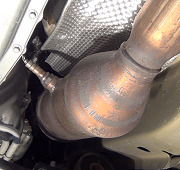Causes Of Converter Failures
Fouling, clogging, melt-down and breakage of the ceramic substrate inside a converter are common conditions that can cause problems. Plugging is usually the end result of a melt-down, which occurs because the converter gets too hot. This happens because the engine is dumping unburned fuel into the exhaust. The excess fuel lights off inside the converter and sends temperatures soaring. If it gets hot enough, the ceramic substrate that carries the catalyst melts.
The unburned fuel may be getting into the exhaust because of a bad spark plug or valve, but an overly rich air/fuel mixture is another possibility. In older carbureted engines, a heavy or misadjusted carburetor float may be the underlying cause. But on newer engines with "feedback" carburetion or electronic fuel injection, the engine may not be going into "closed loop" (the normal mode where the computer regulates the air/fuel mixture to minimize emissions).
A bad oxygen sensor or coolant sensor may be giving the computer bogus information. A sluggish or dead O2 sensor will make the computer think the exhaust is running lean, so the computer will try to compensate by making the fuel mixture rich. A coolant sensor that always indicates a cold engine will also keep the system in open loop, which means a steady diet of excess fuel. But it might not be the sensor's fault. A thermostat that's stuck open or is too cold for the application can prevent the engine from reaching its normal operating temperature. So if your converter has failed and needs to be replaced, the engine should be diagnosed for any underlying problems before the new converter is installed.
Another cause of converter clogging and contamination is excessive oil consumption. Worn valve guides or seals can allow oil to be sucked into the engine's combustion chambers. The same goes for worn or damaged rings or cylinders. Oil can form a great deal of carbon, and metals present in the oil can contaminate the catalyst. A compression check or leak-down test will tell you if the rings are leaking, while a fluttering vacuum gauge needle will help you identify worn valve guides.
Friday, June 27th, 2008 AT 3:36 PM



